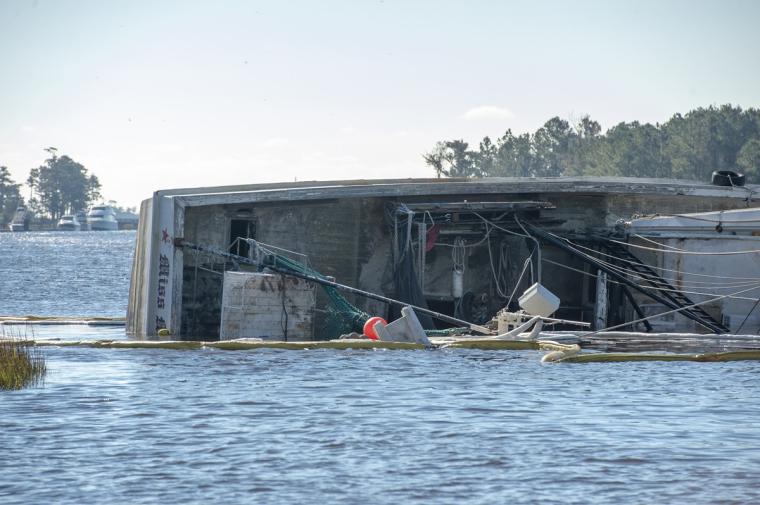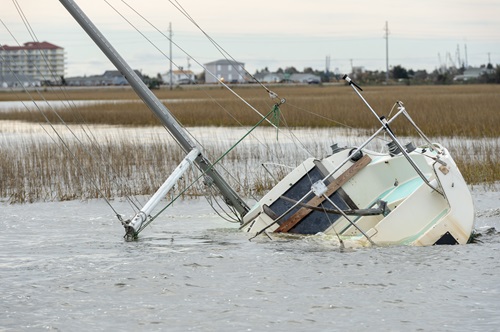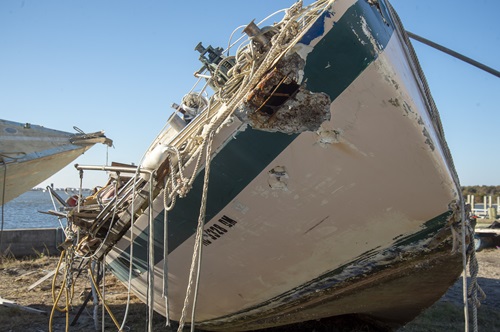
All photos courtesy of ADV
When the Francis Scott Key Bridge, which spanned a major waterway in Maryland, collapsed after a container ship hit it earlier this year, resources were immediately put toward removing the enormous chunks of the bridge that had sunk – as well as to moving the ship out of the way in order to free up the channel to allow the Port of Baltimore to continue doing its job.
It was essential work and it had to be done in order to keep commerce moving. Yet smaller waterways nationwide wrestle with unsightly and problematic abandoned and neglected boats that each day, and anglers (both competitive and recreational) are forced to maneuver their boats and kayaks around them in order to remain safe. While everyone hates the problem, the response has long been a shrug and a sigh, and a muttered, “What can you do?”
Now, a national foundation is offering event owners and organizations grant money to help remove that debris and keep the waterways safer, cleaner and better looking. And if you’re an organization that wants to get in on the action and clear the water, now is the time to do so.
In a nationwide effort to remove abandoned and neglected boats from the nation’s waterways, the Boat Owners Association of the United States (BoatUS) Foundation is seeking organizations to submit projects for funding.
The massive cleanup effort to remove abandoned and derelict vessels (ADV) in U.S. coastal waterways and the Great Lakes is fueled by a four-year, $10 million grant from the National Oceanic and Atmospheric Administration (NOAA) Marine Debris Program with funding provided by the Bipartisan Infrastructure Law.
 Applicants are encouraged to submit a letter of intent between now and August 12. Details are here.
Applicants are encouraged to submit a letter of intent between now and August 12. Details are here.
According to BoatUS, “ADVs litter ports, waterways and estuaries all over the country and can cause major problems. These boats can crush or smother sensitive plants and corals, sink or move during coastal storms, threaten safe navigation, and contribute to economic losses. Removing ADVs is a costly effort, often averaging more than $24,000 to remove a single boat. For many communities, there may be no local funding for removal of vessels, and navigating complicated funding programs can be challenging for communities with limited time or resources.”
$24,000 is an amount many organizations can’t begin to cover, even though the removal of even one boat can make a tremendous difference in the quality of a waterway and the experience of those passing through it.
Additionally, not much attention is paid to the problem of small ADVs, although there certainly are estimates of losses of larger vessels, which tend to be more high-profile.
Gene Gilliland, Bassmaster’s Conservation Director, who is also a member of the Sportfishing & Boating Partnership Council, is all too aware of the problem of ADVs and how they affect not just the waterways but those who use them.
“We have been discussing the issue of abandoned and derelict vessels for several years,” he notes. “As you might expect, with the emphasis placed on coastal waters, most bass anglers would have a hard time connecting the dots on how this might affect them. However, there are a number of tidal bass fisheries that are quite important both to tournament and recreational anglers. We hold events on the Sabine River in Orange, Texas; Winyah Bay in Georgetown, South Carolina; James River in Richmond, Virginia; and the Upper Chesapeake Bay in Northeast, Maryland. Coastal Louisiana (Venice to Lake Charles), although not as much of a tournament destination, is still a vibrant fishery. Each of those locations has had issues with hurricane and storm surge/flooding damage that have created navigation/safety hazards for other anglers and boaters. It is great to see NOAAA making funds available to begin to address this problem. Funding to help remove marine debris in these tidal fisheries should be welcomed by local communities and fishing/boating organizations and I would urge them to look into this grant program.”
According to NOAA, vessels become abandoned and derelict for many reasons. Owners may neglect or abandon their boats when they can no longer afford to maintain them. Some boats may break loose from anchors or moorings and drift away, and some may be stolen. Severe weather events, like hurricanes or flooding, can also result in large numbers of vessels becoming abandoned and derelict. In these conditions boats can sink at moorings, become submerged in tidal areas, or strand on shorelines, reefs, or in marshes.
The website, Sailboat Owners, says that the problem took an uptick during the pandemic, noting, “More and more boat owners, no longer able to afford (or care about) maintenance of their vessels, [were] grinding off hull ID numbers and intentionally sinking their boats or abandoning their carcasses on backwater beaches, hoping to evade moorage fees, insurance requirements and other costs of boat ownership.”
Abandoned and derelict vessels can cause long-lasting problems by blocking navigational channels, damaging ecosystems and diminishing the recreational value of the surrounding area. Some vessels may contain fuel and hazardous materials, which could leak into the surrounding water. And it can be difficult (and sometimes impossible) to determine ownership of the watercraft. Salvage laws can also be tricky.
The grant program is intended to assist organizations that simply want to pull debris out of and away from their waterways, and to create a safer, more healthful waterway.
“We’re excited about building upon our years of experience with ADV removals,” said BoatUS Foundation Director of Outreach and Grant Program Director, Alanna Keating. “This is a unique program that is open to any organization, non-profit or for-profit, as well as local, state, territorial, tribal and regional government agencies. Some of our focus will be seeking underserved or marginalized communities that don’t have the local resources to rid their shores of abandoned and derelict vessels.”
 BoatUS’s $10 million grant is only one of those awarded by NOAA; other grant recipients from around the USA are listed on this page.
BoatUS’s $10 million grant is only one of those awarded by NOAA; other grant recipients from around the USA are listed on this page.
“Abandoned and derelict vessels are a widespread problem across the United States," said Nancy Wallace, Director of the NOAA Marine Debris Program. “We are pleased to partner with the BoatUS Foundation to maximize our impact, while reducing the accumulation of costly and damaging debris in our ports, waterways, and coasts.”
The goal of the BoatUS Foundation program is not just to improve waterways but to create a first-of-its-kind national online database to track ADV location and removal efforts. By removing the associated pollution, navigation and safety hazards ADVs can cause in waters for years, the 20-75 awardees of this grant program are expected to have a lasting, positive impact on the environment and its waters locally and nationally for years to come. (NOAA’s Marine Debris Program offers its InfoHub at this link.)
Organizations that apply for ADV removal funds must a letter of intent that answers the following questions:
- Body of water from which the debris will be removed
- The purpose of the project and the planned steps to complete it
- Anticipated outcomes of the project on the environment and the community
- How diversity, equity, justice and inclusion will be part of the project
- Project budget and expenses to be covered by the grant funding
- Authorizations and/or permits needed to complete the work
Priority will be given to projects that include input from and benefit tribal, underserved or low-income communities; demonstrate strong community support; benefit marine animals and their habitats, local coastal communities, and/or local economies; and include local outreach and education activities directed toward the boating community and general public to prevent abandoned and derelict vessels.
More information on how to apply and grant guidelines can be found here.
Need more information on the program itself? Call 800-245-2628 or email cleanwater@boatus.com.

